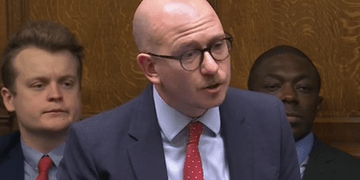
Welsh rugby legend Gareth Thomas hopes the heightened empathy towards viruses generated by the Covid-19 pandemic can help end the stigma and reluctance to get tested for HIV.
A survey commissioned by the former dual-code international’s Tackle HIV campaign revealed 84 per cent of respondents said sexual health was a high or very high priority, but only 45 per cent would consider getting tested for HIV and just 22 per cent had tested previously.
That drop off is something Thomas, 47, hopes to tackle head on and given the entire British population has got used to testing themselves for Covid over the last two years, he is adamant a shift in attitude towards viruses can enhance his quest to dispel the HIV taboo.
“Covid has put everything on the backburner, so many people weren’t going to get tested,” said Thomas, who is HIV positive but lives a happy, healthy and normal life and thanks to medical advances – by taking one pill a day – will not transmit the virus sexually to his husband.
“Because everybody was concerned with Covid first and foremost and that seemed to be the only thing around.
“Now we are hopefully, and thankfully, reaching the end of that – I’d like to think that people’s empathy towards viruses isn’t from fear or not wanting it to land on their doorstep.
“I really believe and hope that we can use Covid and the way that people tested, were treated and understood it as a way of engaging with people around all viruses and especially HIV.”
Amid rugby union’s Six Nations tournament, Tackle HIV – a public awareness and education initiative in partnership with ViiV Healthcare and Terrence Higgins Trust – has released the Sex of our Nations report.
Over 6,000 adults across England, Wales, Scotland, Ireland, Italy and France were questioned, revealing the differing levels of attitude and acceptance surrounding sexuality and HIV.
Particularly frustrating for 2005 Grand Slam winner Thomas is the common misconception that those from backgrounds not traditionally associated with HIV are not at risk of transmitting the virus.
In fact, the survey revealed that in 2020, for the first time in ten years, half of all new HIV diagnoses in England were in heterosexual people which jars with the 28 per cent of people polled that said they would not consider an HIV test as they believed they were not at risk.
Thomas added: “If they are not gay, a bisexual male or black African man or woman – which are the characteristics people assume are the only ones that live with HIV, then we understand that these people are not going to get tested because a lack of education means they feel they are not at risk.
“You realise it’s actually a problem and why HIV is still being transmitted. It’s such a simple process nowadays to get tested. It’s really important that everybody gets tested because for me the fear is not knowing your status.
“If you look at Covid, we’ve all gone through the process of testing ourselves weekly or daily for a virus, so we all understand the importance of doing it.
“So, to do it once or twice a year or when you put yourself at risk [is not hard]. Most new infections are from people who don’t know their status, so people need to understand that if you don’t know it, then you should go and find out.”
The survey also exposes a shocking lack of acceptance in what are considered free and liberal European nations, with only 66 per cent suggesting they were completely accepting of homosexuality.
“It’s really important that we realise what’s on our doorstep,” explained Thomas. “Sometimes we think that if we don’t hear, see or come across discrimination then it doesn’t exist.
“Maybe because you don’t speak about or don’t live your life with a certain characteristic – you’ve never come across it but sometimes it takes surveys like this for people to realise that it is there.
“Yet It’s really important that everybody feels like they are able to get the knowledge that will give them the power to join the conversations, be allies and call people out for being needlessly discriminative.”


















































